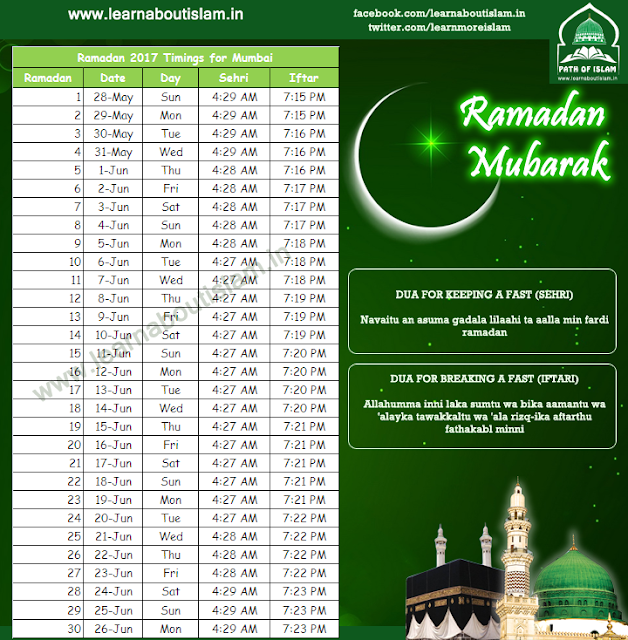 |
| Itikaf Niyat and Itikaaf Dua in Ramadan |
Itikaf (Aetikaf) Niyat in Arabic
بسم الله دخلت و عليه توكلت و نويت سنت الاعتكاف۔ اللهم افتح لي ابواب رحمتكك
Itikaf Niyat English Transliteration
Bismillahi Dakhaltu Wa'Alayhi Tawakkaltu Wanawaytu Sunnatul I'tikaaf
Itikaaf Niyat in English
“With the Blessed Name of Allah have I entered (into the Masjid) and in Him have I placed my trust, and I have made the intention of the Sunnah of I’itikaf. O Allah open Your doors of Mercy upon me.”
Niyyah For Nafl I'tikaf
NAWAYTUL I`TIKFA MA DUMTU FIL MASJID
I intend making I'tikaf for Allah, the High,
the Glorious, as long as I remain in the Masjid.
What is Itikaaf?
Itikaaf is to remain in Masjid for particular days with the intention and purpose of Allah's worship and dedicating himself to Allah in devotion in form of Dua, Azkar, Namaz, Zikr.
Itikaaf is sunnat-e-Mu’akkadah and must be performed in mosque in the last 10 days of Ramadan.
[Hazrat Sheikh ‘Abd al-Haq “Muhaddith-e-Dehlwi in Ashi’ah al-Lam’at Vol. 2 Pg. 118]
This can by one person or by group of persons of the particular place. As this is sunnat-e-Mu’akkadah, neglecting it will be accountable to the whole place of area they belong. If even a single person performs Itikaaf, the this religious duty shall be fulfilled on behalf of everyone. This Itikaaf is Sunnat-e-Kifayah.
Who is Mu'takif?
A person performing Itikaaf is called as Mu'takif. The mu’takif smust devote himself Allah prayers. Recite the Holy Qur’an, Read Hadiths Holy Prophet sallallahu alaihi wasallam, learn and gain Islamic knowledge.
(Fatawa-e-‘Alamgiri, Vol 1 Page 198)
Types of Itikaaf
1) Wajib: This is for the one who had made a mannat or vow or pledge of Itikaaf for the sake of Allah, if his wish is fulfilled. This is to be performed for 3 days with fasting in it.
2) Sunnat-e-Mu’akkadah: This is performed on the last 10 days of Holy month of Ramadan. The person must enter on the 20th of Ramadan before sunset, Make the intention or Niyaat of Itikaaf to stay for 10 days and leave on 30th of Ramadan, after the moon is sighted.
3) Mustabab or Sunnat-e-Ghair Mu’akkadah: This is Nafl Itikaaf performed at any time. Lets say you entered the masjid, make a intention or niyaat of Nafl Itikaaf. You will be rewarded till the time you are in Masjid. Fasting is not required in Mustahab Itikaaf
Conditions Of I'tikaf:
1. Niyyah: Intention.
2. Taharah: To be free from Hadathul Akbar for entry and all hadath
for acquisition of reward.
3. Sanity: i.e. a person should not be mad.
Things Permitted During I'tikaf:
1. Eating.
2. Sleeping.
3. Discussing matters of Deen or necessary talk.
NOTE: It is Makruh to observe complete silence as a form of Worship
this does not however permit worldly talk.
One Is Permitted To Leave The Masjid:
1. For wajib ghusl.
2. For wudhu.
3. To answer the call of nature (toilet).
NOTE: Leaving the Masjid without a Shar’i reason will nullify the I'tikaf.
Things To Do During I'tikaf:
A Mu'takif should engage himself in the following:
1. Ibadah (any form).
2. Recital of the Holy Qur'an.
3. Nafl Salaah and dhikr.
4. Salawat (Durud) and Istighfar.
5. Remembrance of Allah I.
6. Learn or teach the knowledge of Deen.
Reward Of I'tikaf
Ibn Abbas Radi ALLAHu Ta'ala Anha narrates Holy Prophet Peace and Blessings be Upon Him related ‘Whomsoever performs I'tikaf for a day: Allah I will spread three trenches between him (or her) and the fire of hell. The width of each trench being greater than the distance between the Heaven and earth.’
In addition: to perform I'tikaf of the last ten days of Ramadhan is equivalent to the reward of two Hajj and two Umrah!
Few Hadiths on Itikaaf
1) Hadrat ‘Ayeshah Siddiqah Radi ALLAHu Ta'ala Anha reported that the Holy Prophet Peace and Blessings be Upon Him used to engage in I’tikaaf. i.e. private devotions in the mosque during the last ten nights of Ramadan till he met his Lord. [Sahih Bukhari, Vol 1, Page 271 - Sahih Muslim, Vol 1, Page 371]
2) Hadrat Anas Radi ALLAHu Ta'ala Anhu reported that the Holy Prophet Peace and Blessings be Upon Him used to engage in I’tikaaf in the mosque in the last ten days of Ramadan. But, one year he omitted the I’tikaaf so he engaged in I’tikaf during twenty nights the following year. [Sunan Abi Dawood, Vol 1, Page 334]
3) Baihaqi has reported on the authority of Hadrat Imam Husain that the Messenger of Allah has stated, “whosoever performs I’itikaf for ten days in the month of Ramadan, it is as though he has performed two ‘Umrah (lesser pilgrimage) and two Hajj (greater pilgrimage).”
Itikaaf for Women
Women can also perform Itikaaf at home by designating a part of their home, devoting self in Zikr, Namaz, Dua for Allah. Once you have made the intention of Itikaaf, you cannot take part in any household activities apart for your own requirement.
This is also performed for last 10 days of Ramadan, from 20th of Ramadan before sunset till 30th Ramadan till Moon Sighting. All the purity rules are applicable here also to the one performing Itikaaf
Important Notes by Mufti Muhammad Shahid Barkati
- A man who performs i'tikaaf can go to the ghusl or wudhukhana built inside the mosque for all kinds of ghusl, but outside the mosque can go only for ghusl of impurity, that too when bathing in the mosque is not possible in any way. One cannot go out of the Masjid for Ghusl of cleanliness, coolness or Sunnah.
- The place where the woman is performing i'tikaaf cannot go outside the place for any kind of Ghusl to any part of the house, even if the bathroom is on the side. If the impurity is caused by Ehtilam, then one can go to the home made bathroom, Hajj, Nifaas and association will break Itikaaf.
































